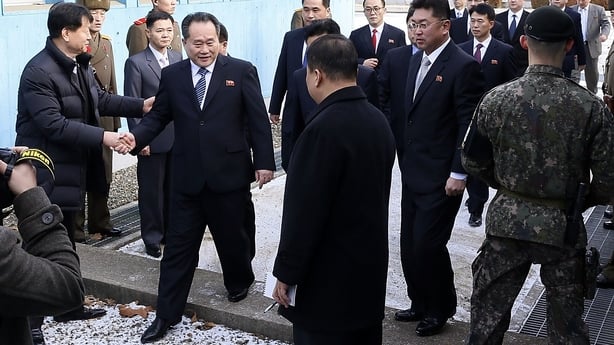North and South Korea have held their first talks in more than two years, which the United States have hailed as a good first step in solving the crisis over the North's nuclear missile programme.
However, North Korea said it would not discuss weapons that were only aimed at the US.
The US State Department said it would be interested in joining future talks, but stuck to its insistence they must be aimed at denuclearisation, something North Korea rejects, showing that a diplomatic breakthrough remains far off.
In a joint statement after 11 hours of talks, North Korea pledged to send a large delegation to next month's Winter Olympics in South Korea, but made a "strong complaint" after talks proposed by South Korea to denuclearise the Korean peninsula.
"Clearly this is a positive development," Steve Goldstein, a spokesman for the US State Department told a news briefing.
He added: "We would like nuclear talks to occur; we want denuclearisation of the Korean peninsula. This is a good first step in that process."
North and South Korea said they agreed to meet again to resolve problems and avert accidental conflict.
It comes amid high tension over North Korea's programme to develop nuclear missiles capable of hitting the US, but the North said disarmament would not be part of the discussions.
"All our weapons, including atomic bombs, hydrogen bombs and ballistic missiles, are only aimed at the United States, not our brethren, nor China and Russia," said Pyongyang's chief negotiator, Ri Son Gwon.
"This is not a matter between North and South Korea, and to bring up this issue would cause negative consequences and risks turning all of today's good achievement into nothing," warned Mr Ri, who is chairman of the North's Committee for the Peaceful Reunification of the Fatherland.

US President Donald Trump and North Korean leader Kim Jong Un have exchanged threats and insults in the past year, raising fears of a new war on the peninsula.
The White House did not immediately comment on the US being the only potential target of North Korea's nuclear weapons.
Read more
IOC welcomes Olympic proposals
The US, which has 28,500 troops stationed in South Korea as a legacy of the 1950-1953 Korean War, initially responded coolly to the idea of inter-Korean meetings, but Mr Trump later called them "a good thing" and said he would be willing to speak to Mr Kim.
"At the appropriate time, we'll get involved," Mr Trump said on Saturday, although US-North Korean talks appear unlikely, given entrenched positions on both sides.
The US, which has warned that all options, including military ones, are on the table in dealing with North Korea, insists that any future talks must have the aim of denuclearisation.
The North-South thaw has not altered the US intelligence assessment of North Korea's weapons programmes.
The consensus, according to five US officials familiar with the classified analysis, is that Mr Kim remains convinced the US is determined to overthrow him and that only a nuclear arsenal that threatens America can deter that.
One of the officials said the North-South talks were likely to follow the pattern of past diplomatic efforts, in which the North has benefited from additional food and other aid without making any concessions on the weapons front.
The additional danger now, said a second official, was that Mr Kim would seek to use the talks to take advantage of Mr Trump's sometimes bellicose rhetoric to try to drive a wedge between Washington and Seoul.
Earlier, South Korea said it was prepared to lift some unilateral sanctions temporarily so North Koreans could visit for the Winter Olympics.
North Korea said its delegation would include athletes, high-ranking officials, a cheering squad, art performers, reporters and spectators.
Talks to work out details would be held soon, the South's unification ministry said.
The talks were the first between the two Koreas since 2015 and were held at the Peace House on the South Korean side of Panmunjom truce village.

